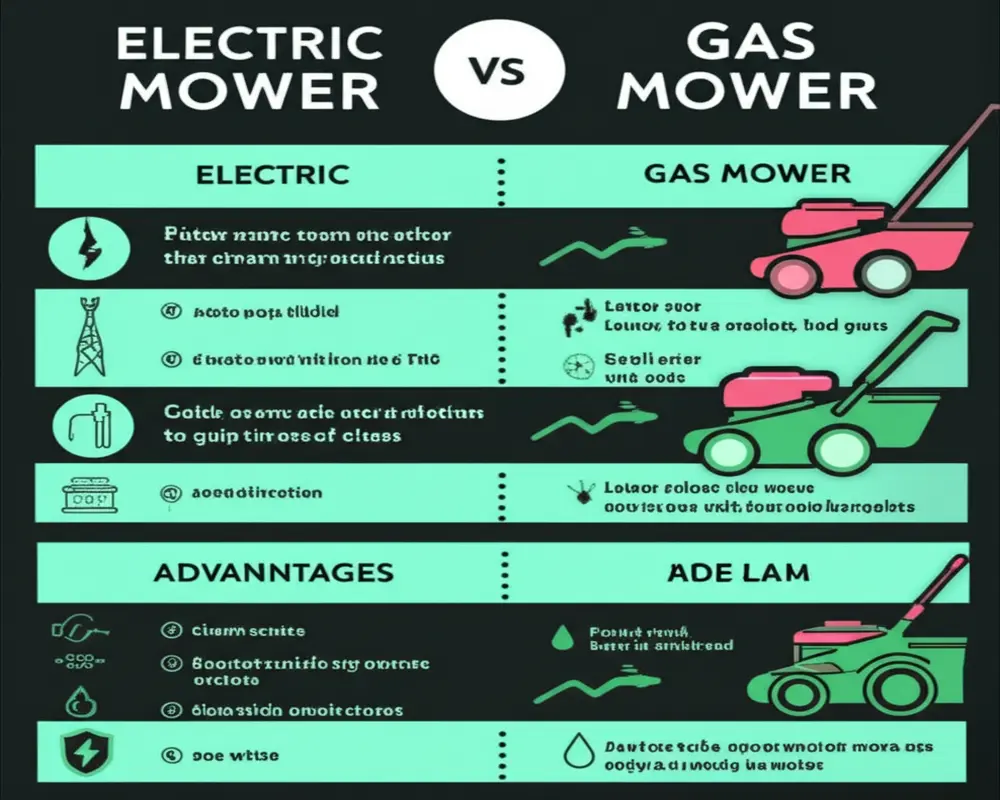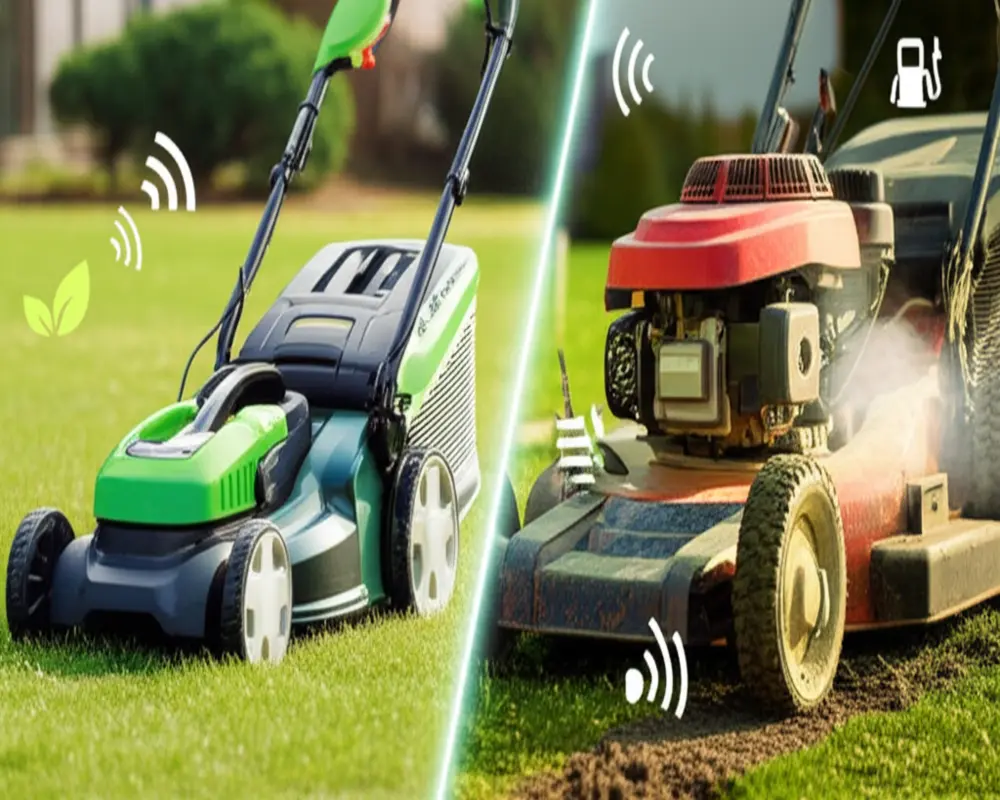Electric vs Gas Lawn Mower: Ultimate 2025 Buyer’s Guide
Thank you for reading this post, don't forget to subscribe!Choosing between an electric vs gas lawn mower has long been a defining dilemma for homeowners and landscaping professionals alike. As the technology evolves rapidly in 2025, understanding the nuances of these powerhouses of lawn care technology becomes paramount. This detailed guide aims to offer an expert perspective on picking the right mower tailored to your yard size, terrain, environmental values, and lifestyle.
We cover essential factors such as cost, performance, maintenance, noise pollution, and ecological impacts with a comparison lens, ensuring a comprehensive grasp of what each mower type brings to the table in today’s landscape.
Electric vs. Gas Lawn Mowers: Quick Comparison Table
The following table offers a straightforward side-by-side glance at major factors to help you arrive at a quick decision:
| Feature | Electric Lawn Mower | Gas Lawn Mower |
|---|---|---|
| Initial Cost | Moderate to High | Low to Moderate |
| Noise Level | Low (~60-70 dB) | High (~85-95 dB) |
| Maintenance | Minimal (battery care, occasional blade sharpening) | High (engine tune-ups, oil changes) |
| Power Output | Sufficient for average yards; limited for thick/tall grass | High power suitable for large, rough terrain |
| Environmental Impact | Zero emissions during use | Emits greenhouse gases and pollutants |
| Convenience | Easy start, light weight, cordless options | Fuel refilling required, heavier machine |
| Optimal Yard Size | Small to medium (< 1/2 acre) | Medium to large (> 1/2 acre) |

Understanding Electric Lawn Mowers
What Are Electric Lawn Mowers?
Electric lawn mowers use electric motors powered either by a direct power cord or rechargeable batteries. There are two primary categories:
- Corded Electric Mowers: These must be plugged into an electric outlet, offering unlimited runtime but restricting mobility and requiring careful cord management.
- Cordless (Battery-Powered) Mowers: Offer freedom from cords and increased convenience. Powered by lithium-ion batteries, they typically range from 30 to 90 minutes of use per charge depending on battery capacity and mower model.

Cordless models especially suit users prioritizing lightweight, quiet operation for manicured lawns with easy access to charging.
Key Advantages of Electric Mowers
The chief benefits of electric mowers include their environmental friendliness due to zero gas emissions, low noise output generally around 60-70 decibels, and reduced maintenance requirements. They also often come with user-friendly features like push-button starts and straightforward handling thanks to their lighter construction.
Key Disadvantages
Electric mowers face challenges like limited runtime—especially in battery-powered types—battery degradation over time, and the inconvenience of charging downtime. Cord management can be cumbersome with corded versions, and initial costs tend to be higher than many entry-level gas models. Moreover, electric motors might lack the brute force required for thick or tall grass, making them less suitable for challenging terrains.
Understanding Gas Lawn Mowers
What Are Gas Lawn Mowers?
Gas mowers operate with internal combustion engines using gasoline. They often feature either 2-stroke or 4-stroke engines:
- 2-Stroke Engines: Lighter and simpler, but louder and less fuel-efficient, generally used in compact mowers and more occasional use.
- 4-Stroke Engines: More durable and fuel-efficient, quieter combustion, and standard for larger, professional-grade mowers.
Engine displacement — measured in cubic centimeters (cc) — plays a pivotal role in power output. Larger displacement translates to stronger torque and better performance on dense and rugged grasses.

Advantages of Gas Mowers
Gas mowers deliver higher power and torque, enabling efficient cutting through tough, wet, or overgrown grass. An unrestricted runtime, only limited by fuel supply, suits them well for larger yards or commercial applications. Their build quality generally supports wider cutting decks and durability for prolonged use, and entry-level models boast lower upfront price tags.
Disadvantages
On the downside, gas mowers produce emissions contributing to air pollution and noise levels ranging from 85 to 95 decibels, demanding hearing protection during use. Maintenance involves regular oil changes, spark plug replacements, and carburetor tuning, besides the cumbersome fuel storage and handling safety concerns. They tend to be heavier, complicating transport and storage for some users.
Head-to-Head Comparison
Performance & Power
When comparing cutting ability, gas mowers excel on thick, tall, or coarse grass, offering superior torque and horsepower equivalent to approximately 4 to 7 horsepower (3 to 5.2 kW). Electric mowers, while quieter, are generally rated in the 1.5 to 3 horsepower range, sufficient for manicured, moderate grass types. Mulching and bagging efficiencies hinge on mower model design and blade quality, but gas mowers tend to deliver more consistent mulching under demanding conditions.
Cost Analysis
The true cost of ownership extends beyond purchase price. While gas mowers often start cheaper, fuel and engine maintenance add up over time. Electric mowers have fewer consumables, but battery replacements, averaging $100-$200 every 3-5 years, incur costs. Resale value tends to be higher for gas mowers due to their longevity and repairability.
Maintenance & Durability
Electric mowers require less frequent maintenance—primarily battery care and blade sharpening—whereas gas mowers demand periodic engine servicing including oil changes, air filter cleaning, and spark plug checks. Gas models often last longer commercially with proper upkeep but necessitate more technical know-how. For users preferring convenience, electric options reduce the worry of engine breakdowns and fuel stabilization.
Environmental Impact & Noise Levels
Electric mowers operate with zero emissions during use, providing a greener alternative especially suited for environmentally conscious users or neighborhoods with noise restrictions. The noise output is significantly lower, improving user experience. In contrast, gas engines emit pollutants contributing to carbon emissions and climate change, alongside higher noise disturbances affecting community comfort.
Convenience & Ease of Use
Electric mowers facilitate quick starts with push buttons and tend to be lighter, easing maneuverability. Cordless variants enhance freedom of movement, while corded models require thoughtful planning to avoid tethering limitations. Gas mowers rely on pull cords or electric starters, involve fuel handling, and typically weigh more, but offer unlimited runtime with refills. Self-propulsion availability exists in both types, enhancing ease for larger terrains.
Safety Considerations
Gas mowers pose hazards related to fuel storage and spills, demanding safe practices during refilling. Electric mowers mitigate fuel risks but require caution with cords to prevent tripping or cutting hazards. Both types necessitate attention to blade safety, protective eyewear, and hearing protection especially with louder gas units.
Suitability for Yard Size & Terrain
Electric mowers suit small to medium manicured yards typically less than half an acre, smooth terrains, and light to moderate grass density. Gas mowers thrive in larger areas exceeding half an acre, rugged terrain, and dense or tall grass challenges.
Who Should Choose Electric Lawn Mowers?
Users prioritizing quiet operation, low maintenance, and eco-friendliness with small to medium-sized yards will find electric lawn mowers advantageous. Ideal for residential neighborhoods with noise limits, those seeking hassle-free starts and lightweight handling also benefit. If your yard is compact and you prefer avoiding engine upkeep, electric mowers serve well.
Scenario-based recommendation: For a suburban homeowner with a half-acre lot, children and pets around, and a preference for green solutions, going electric is a smart choice.
Who Should Choose Gas Lawn Mowers?
Those managing extensive, commercial, or challenging lawn conditions requiring the utmost power and endurance should consider gas mowers. They are suited for thick, wet grass, large acreages, and rough terrain such as sloped or uneven yards. Budget-conscious purchasers seeking a lower initial investment and willing to manage maintenance will favor gas models.
Scenario-based recommendation: A property caretaker responsible for multiple large properties with thick Bermuda grass will benefit from a durable gas mower to maintain efficiency.
Making Your Decision: Key Factors to Weigh
Assess your yard’s size, grass type, and terrain complexity first. Gauge your tolerance for noise and maintenance obligations. Take into account long-term savings against upfront costs and consider the evolving technology of batteries, which continues to improve. Testing both mower types in a store or rental setting can provide hands-on insight before purchase.
Beyond Electric vs. Gas: Additional Considerations
Note differences between push versus self-propelled lawn mowers — the latter easing burden for larger or uneven grounds. Understand mulching, bagging, and side discharge options to optimize debris management.
Brand reputation and warranty terms play essential roles in peace of mind, as do available accessories like ergonomic handles or mulching kits to tailor your mower experience.
Frequently Asked Questions
- Is electric mower power sufficient for most lawns?
- Yes, for typical suburban yards with maintained grass, electric mowers provide ample power. For very large or rough areas, gas remains stronger.
- How long do electric mower batteries last, and how often should they be replaced?
- Battery runtimes vary between 30 to 90 minutes per charge, depending on the model. Most lithium-ion batteries last 3-5 years with proper care before replacement is necessary.
- Can gas lawn mowers be converted to electric?
- Due to fundamental mechanical differences, direct conversions are generally impractical. It is more effective to purchase a dedicated electric mower.
- What are the best storage practices for lawn mowers?
- Both types should be stored in dry, sheltered areas. Gas mowers require fuel to be drained or stabilized during off-season. Electric mowers need batteries removed or charged per manufacturer guidance.
- Do electric mowers save money in the long run?
- While initial costs are higher, savings arise in lower fuel and maintenance expenses, especially over 5+ years, making electric options economically attractive for many.
Conclusion: The Best Mower for YOU
Summarily, the choice between an electric vs gas lawn mower hinges on individual circumstances. Consider yard size, environmental values, noise tolerance, and maintenance preferences carefully. Both mower types offer compelling merits in 2025, but your decision should revolve around your specific needs and future outlook.
With informed insights and deliberate evaluation, you are empowered to select the optimal lawn mower and enjoy a well-kept green oasis year-round.
For those intrigued by product care, see our guide on garden spade rust prevention for related lawn tool maintenance tips.
For further insights on gardening tools, visit Consumer Reports on the electric vs gas lawn mowers review and Forbes’ detailed analysis on gas vs electric lawn mower.
Additional comprehensive reviews can be explored at Pro Tool Reviews Lawn Mower Comparison, the Spruce’s in-depth article, and Bob Vila’s expert guide on electric vs gas lawn mowers.

